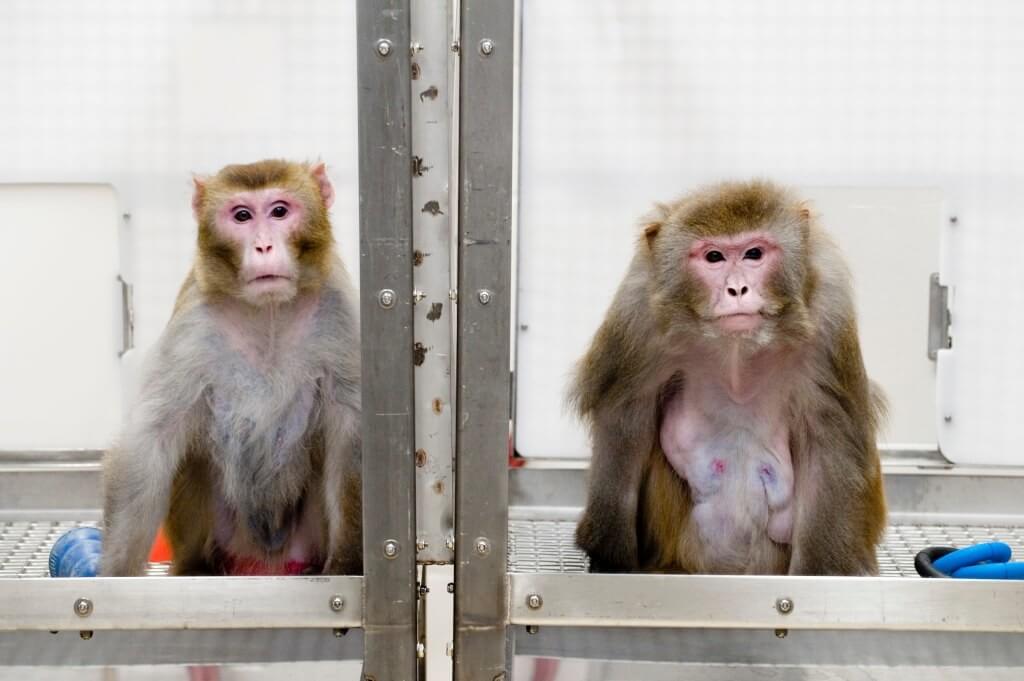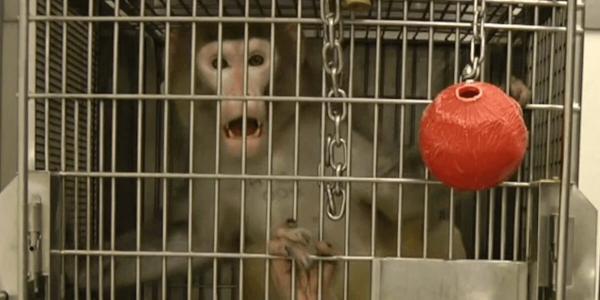Wisconsin National Primate Research Center at the University of Wisconsin–Madison
Updated August 13, 2019:
Mishandling, incompetence, and carelessness at the University of Wisconsin have once again led to pain and suffering for monkeys and other animals—and PETA is calling on the National Institutes of Health to pull funding from this horror show. New federal documents show that a worker broke the femur of a marmoset through improper handling and that the small monkey’s leg was amputated. Another monkey lost part of his tongue and fingers after two monkeys freed themselves from their cages and fought.
Original post:
The Wisconsin National Primate Research Center (WNPRC) is one of seven so-called “flagship primate centers” established and funded by the National Institutes of Health (NIH) and one of the largest primate laboratories in the world. Located in Madison, Wisconsin, the WNPRC is affiliated with the University of Wisconsin–Madison (UW-Madison), which used 1,865 nonhuman primates in experiments in 2017. An additional 703 nonhuman primates were imprisoned at the facility for other purposes, including breeding. In 2018, UW-Madison received more than $315 million from NIH, including a $9.6 million core grant for the basic operations of the WNPRC.
Since 1989, UW-Madison’s Richard Weindruch has starved caged monkeys—depriving them of an extreme 30 percent of needed calories—to see if this would increase their longevity. The monkeys have been caged alone and kept perpetually hungry for nearly three decades. Members of the control group in this experiment were fed an extremely high-sugar diet and became morbidly obese. The experimenters have repeatedly tried to make meaningful claims about the health benefits of caloric restriction, but given the fundamental flaws of this experimental design, it can’t possibly hope to inform us about anything of value.

Experimenter Ned Kalin has exposed infant monkeys to terrifying and threatening circumstances, including frightening them with rubber snakes to elicit anxiety and depression in these emotionally vulnerable animals. Other experimenters at the school have inflicted traumatic spinal-cord injuries on crab-eating macaques. The monkeys were then monitored for “clinical indicators of illness including limb weakness, vomiting, diarrhea, jaundice, bleeding, and anorexia” and killed either 90 or 120 days after being injured.
Federal inspection reports document a long pattern of suffering for animals in the school’s laboratories. Over a recent 11-month period, a dozen incidents occurred in which monkeys sustained serious injuries requiring sutures, including losing portions of their tongues or partial amputations of their fingers when workers failed to secure cages properly. This has been a recurring problem at UW-Madison, and the school has been cited in multiple inspection reports for such neglect. (See here, here, and here.) A 2016 inspection report documents that three monkeys were so dehydrated after the drinking water supply line to their cage became disconnected that they required specialized IV fluid therapy. One of them had to be euthanized. A 2014 inspection report documents that a marmoset monkey died during surgery, likely of asphyxiation, because of a malfunctioning anesthesia machine. In addition, a macaque monkey was burned by a malfunctioning heat lamp and another one strangled to death when she became entangled in a chain that was attached to her cage. A 2004 inspection report reveals that a family of three marmosets “was found dead inside of their nesting box after the cage was sent through the cage washer.” These three monkeys were fully conscious, trapped in their cage, when they were killed with scalding-hot water, yet UW-Madison received only a warning for the incident.
In 2014, the university was fined more than $35,000 for seven violations of federal animal-welfare laws, including one incident in which a cat named Broc was negligently and severely burned by staff during surgery. The animal was being used in a notorious experiment on “sound localization” that ended following a PETA campaign. UW-Madison is one of the largest recipients of federal funding for animal experiments, and this comparatively small fine is unlikely to deter it from further abuse.
The university is currently under investigation by the U.S. Department of Agriculture for additional violations.




